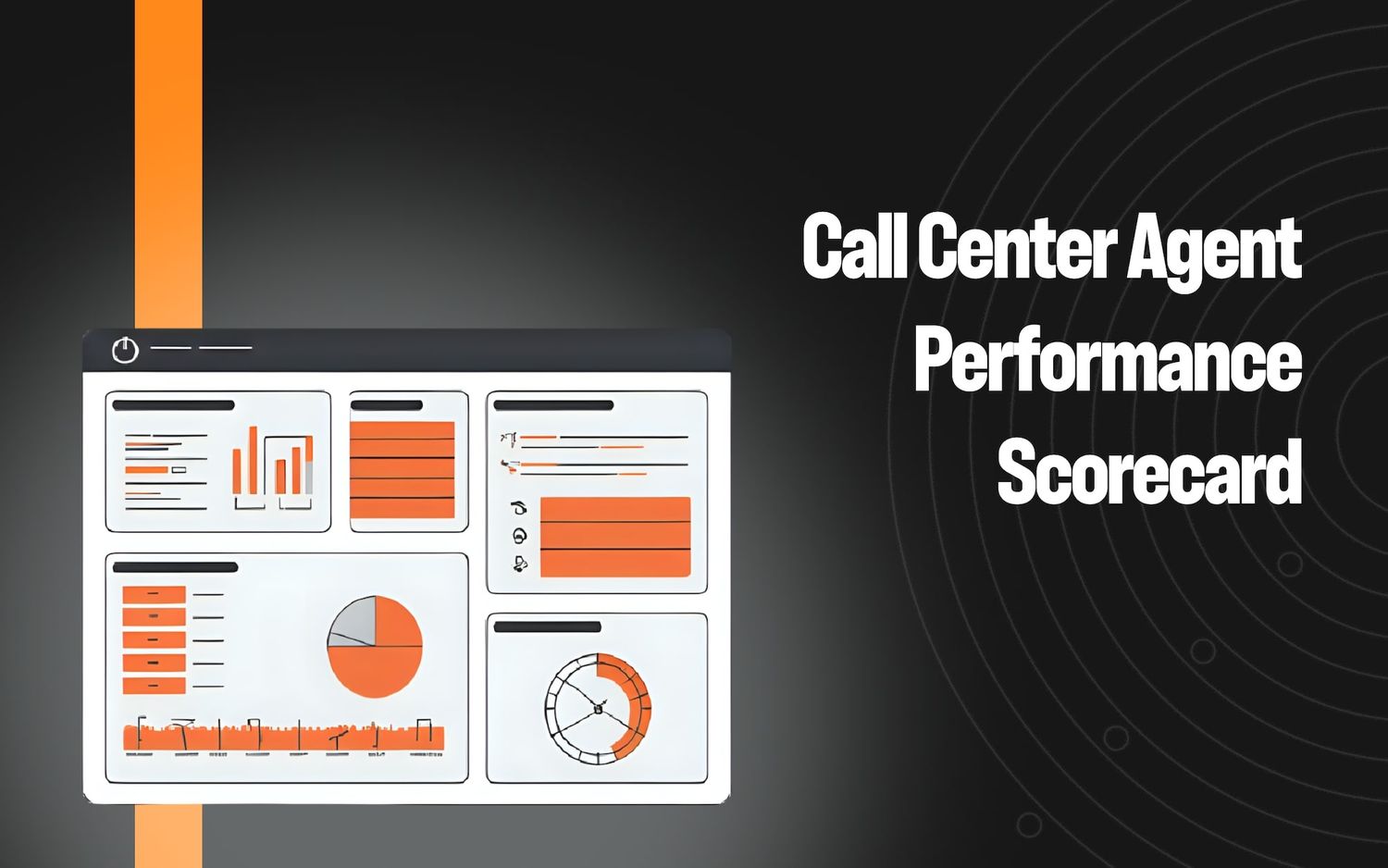6 Best Conversational Intelligence Software for Sales & CX

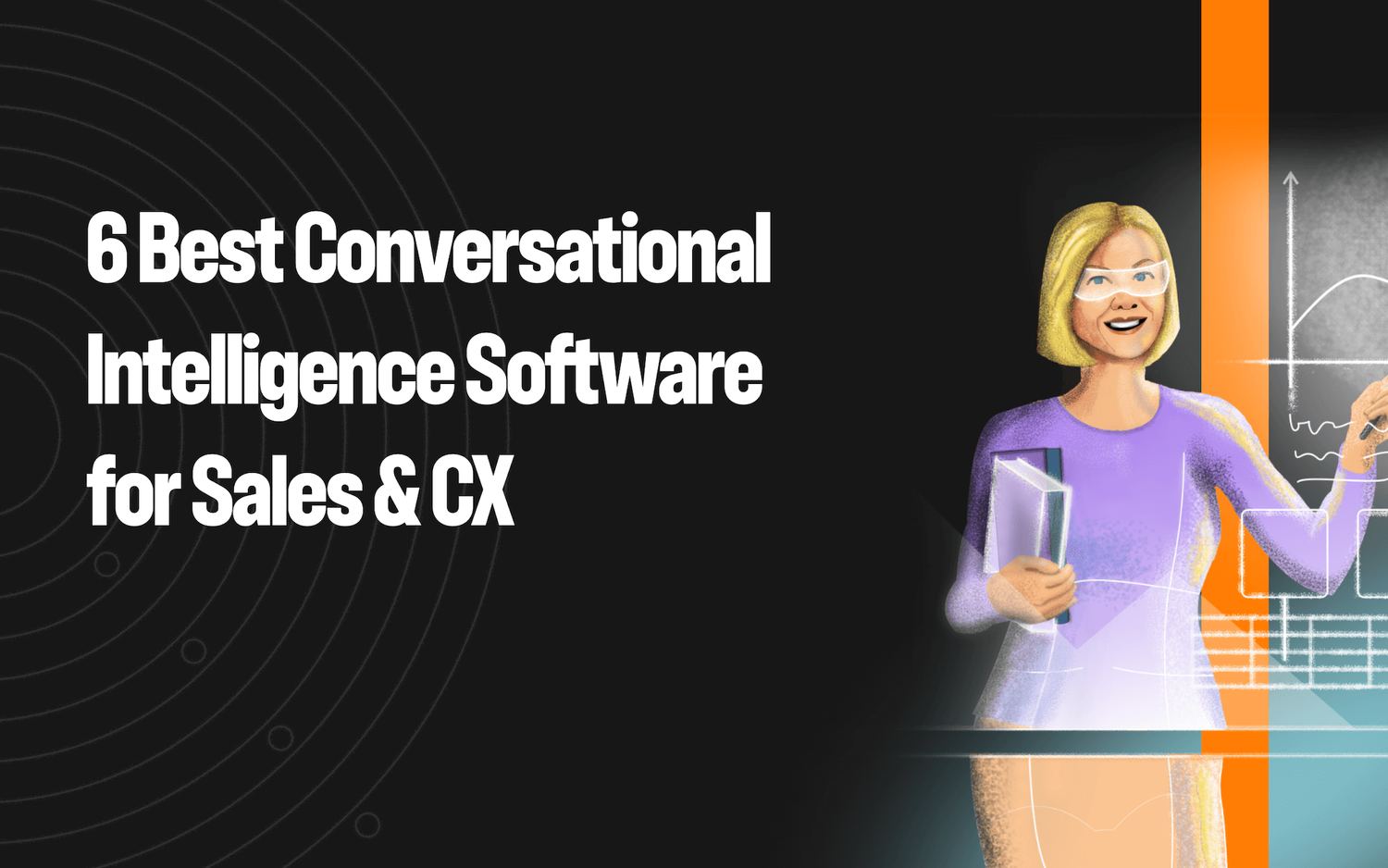
Conversational intelligence software converts vast quantities of voice and text interactions into data that professionals in sales and CX can easily visualize, model, and report on to discover meaningful patterns.
Conversational intelligence software is typically used by:
- Sales teams: These tools help in understanding customer interactions, improving visibility into agent performance, and automating workflows to close more deals effectively.
- Customer experience teams: They leverage these tools to enhance issue resolution processes, boost customer satisfaction (CSAT), and automate workflows to streamline operations and improve service quality.
Conversational intelligence (also known as conversation analytics) tools are a relatively new category of software that uses artificial intelligence to automate some of the time-consuming and laborious tasks of manual reviews.
Without such software, sales agents are confined to scripted responses, and quality assurance teams can only analyze a small fraction of phone calls, leading to missed insights.
Metrics from outdated reporting tools that rely on limited data make it challenging to accurately identify areas for improvement, resulting in inefficiencies and a poor customer experience.
We created Level AI to analyze all interactions in real time, uncovering insights into customer sentiment, product feedback, and common objections.
In this article, we compare six conversational intelligence options — some for sales and others for CX teams.
To kick off our list, we’ll share details on how Level AI helps sales and CX teams gain valuable insights, improve customer interactions, and drive better business outcomes through advanced AI-driven analysis and real-time responses.
Level AI: Context-aware AI for Sales & Customer Service
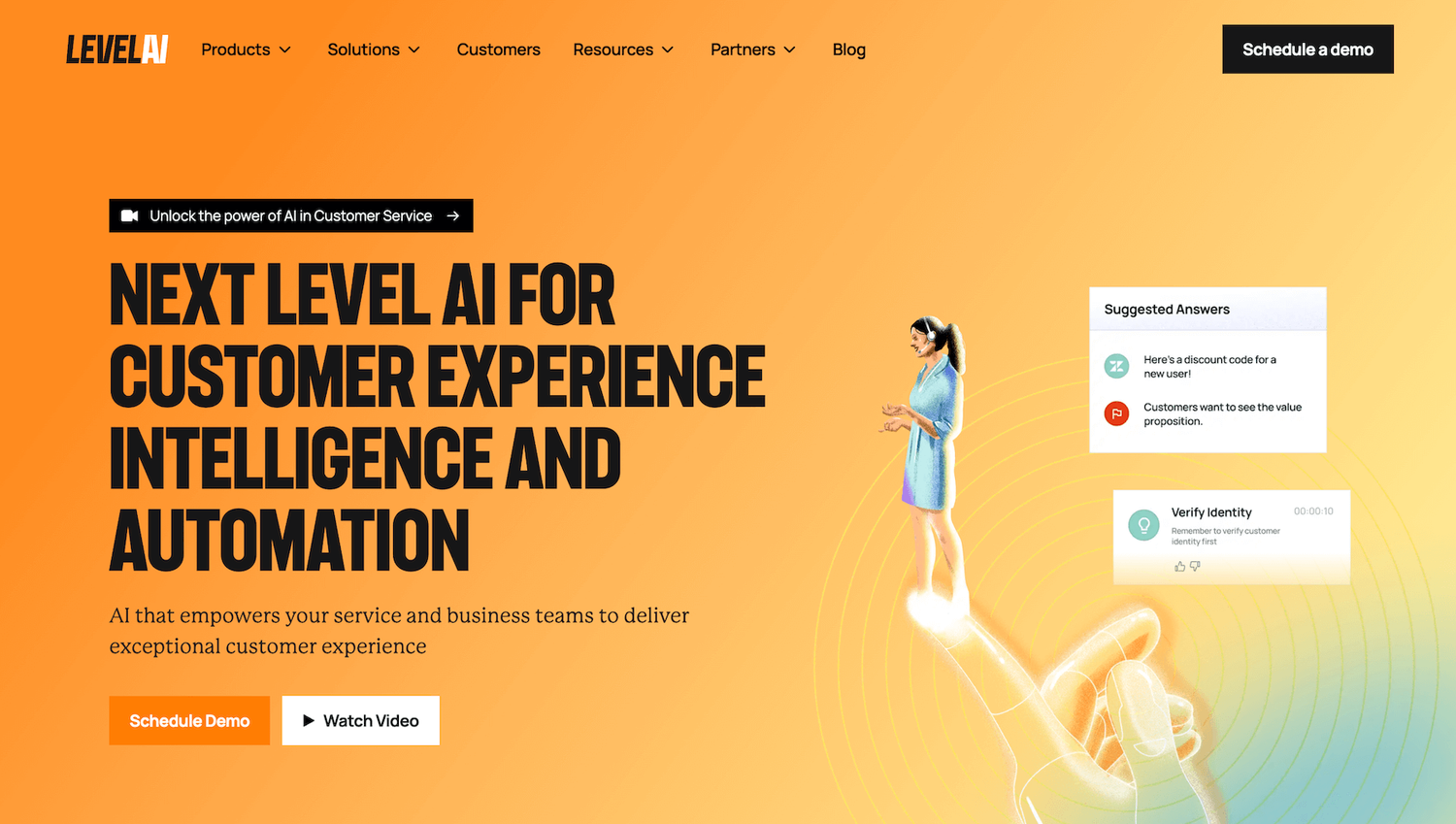
Level AI’s main advantage is its ability to understand the meaning of what’s being said rather than just detecting keywords. Because the AI analyzes language for the intent behind a customer or agent’s words, it can follow the context of a conversation and classify interactions based on your specific business’s sales and customer service scenarios.
This provides a much more comprehensive and nuanced view of the meanings expressed in conversations by both agents and customers than systems that only return exact-word matches.
In the following sections, we’ll demonstrate how our AI’s near-human understanding of conversations allows sales and CX teams to better focus on high-value interactions, more quickly identify and resolve customer issues, and grasp potential issues before they escalate based on patterns and trends in conversations.
Analyzing Customer Intent through Scenarios
Most conversational intelligence tools on the market use natural language processing (NLP) to transcribe and detect notable moments in customer interactions using keywords.
For example, if you query to find customer conversations that mention "delay," it would pull up conversations such as "I want to delay the meeting," "Is there a delay with my package?", etc. However, these tools are simply identifying a given string of characters rather than the meanings behind words, which leads to two main issues:
- Unless there is an exact match, the software will ignore alternate words or complex phrases, except when you specify those exact phrases.
- It will inevitably lump together scenarios that use the same keywords but have different intentions. For example, a prospect saying, "I want to buy this item" and "No, I don’t want to buy this item" will both surface in query results.
In contrast, Level AI can understand what is being said, even when the same intent is expressed differently.
For example, a customer might say “I want to return this rug” or “I need to send this rug back.” Both phrases express the same intent — product return — so Level AI would classify these under the same scenario, which is how our system defines intent.
Scenarios apply equally well to sales calls, where a prospect might express an objection over price, such as "This product is too expensive for us" or "Our budget can't accommodate this cost right now." Our system would classify the underlying intent — price objection — in the same way.
This natural language understanding is helpful for distinguishing between sentences that use the same words but convey different meanings.
For instance, a prospective client might say “Tell me more about your reporting dashboard” or "No, I’m not interested in learning about the reporting dashboard." Level AI can recognize these as different scenarios, whereas with a keyword-based system, you’d need to be very strategic about the inputs to differentiate between them.
Level AI classifies scenarios like "Product Return" or "Price Objection" and then automatically identifies phrases (from either the customer or agent) that suggest that particular scenario. Since scenarios will vary from one business to another, you define your own scenarios within our platform.
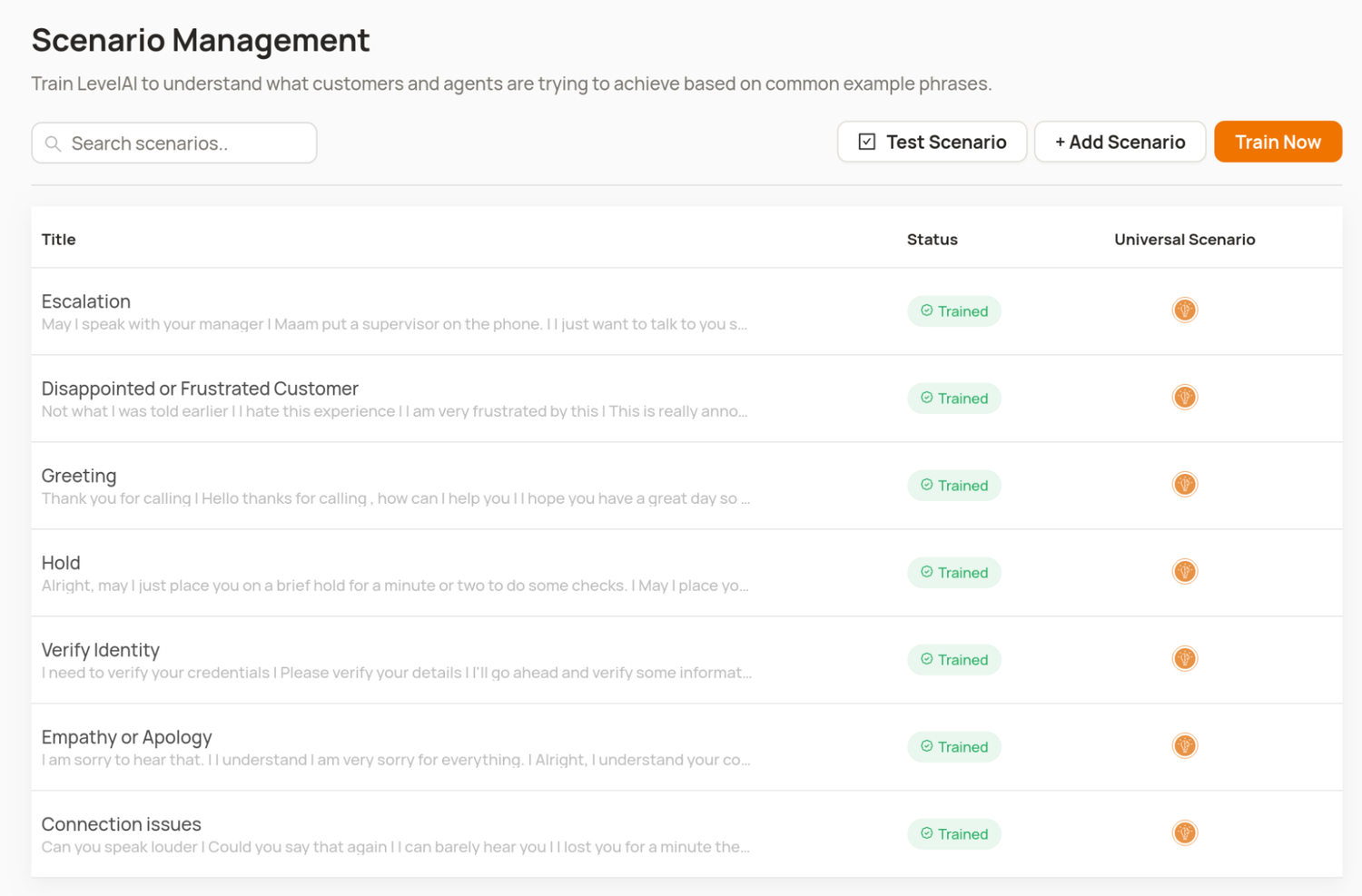
To define a scenario, you provide an initial set of training phrases. Our semantic intelligence model learns from these phrases and applies this understanding to all interactions.
Since it grasps the underlying meanings of your initial set of phrases, it can recognize intents conveyed by an unlimited range of phrases.
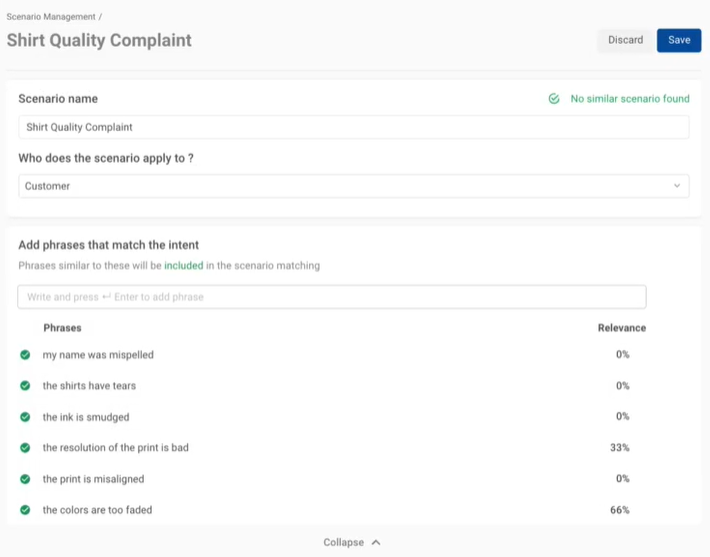
Using conversation tags, we highlight specific phrases within conversations that indicate a given scenario. For example, the system would tag a phrase like “The other company offers that for cheaper” as a "Price Objection."
Our conversation tags, along with all other types of system tags, are filterable and searchable by conversation. This feature allows you to generate curated lists of conversations where, for instance, abusive language occurred.
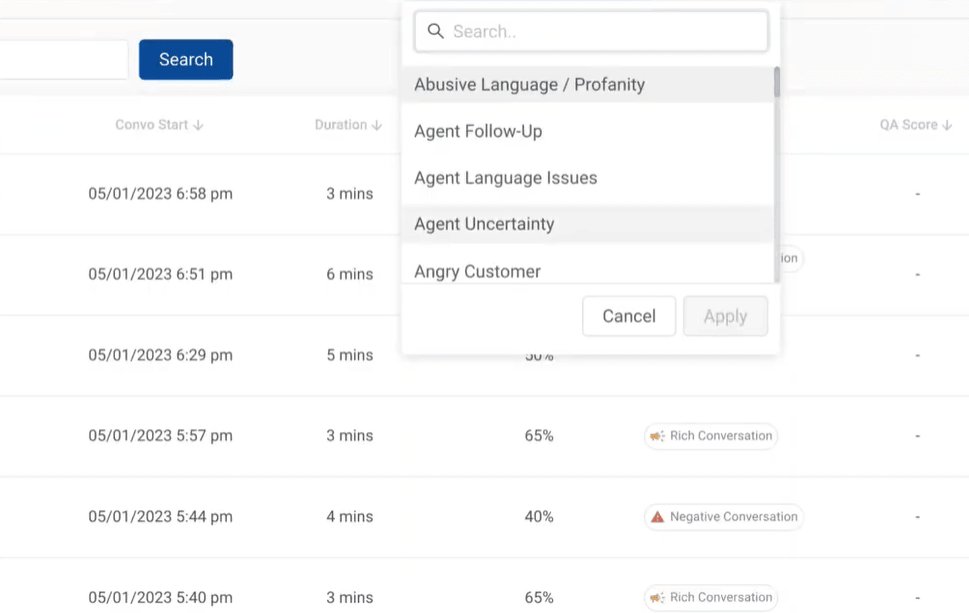
Decoding How They Truly Feel with Sentiment Analysis
Speech analytics software typically measures caller sentiment as either positive or negative, happy or unhappy. But this simplistic approach fails to capture the nuanced and varied emotions expressed by customers or prospects during their interactions.
Many have turned to voice analytics software to measure caller emotions, but these tools can be prone to error. They may misinterpret changes in pitch and tone as agitation, when these shifts could indicate a range of emotions such as excitement or nervousness.
Level AI’s sentiment analysis provides a more comprehensive view by measuring sentiment at various points throughout the conversation, offering real-time insights into the customer’s experience. It does this in two ways:
- The software identifies and highlights occurrences of expressed sentiment in conversations using sentiment tags. It recognizes a wide range of sentiments, including anger, disapproval, disappointment, worry, happiness, admiration, and gratitude.
- As with conversation tags, sentiment tags are filterable and searchable. This allows you to pull up curated lists of interactions or build reports on specific sentiments, such as instances of disappointment.

The platform generates a sentiment score that reflects the overall sentiment of the prospect or customer. This score aggregates the intensities of all sentiments expressed during the conversation, ranging from 1 to 10. Here, 0 represents maximally negative sentiment, 10 represents maximally positive sentiment, and 6 denotes a neutral stance.
To generate this score, the software assigns greater weight to sentiments expressed at the end of the conversation — such as after a resolution or a sale — because these sentiments more accurately reflect the agent’s performance compared to those expressed at the start or middle of the conversation.
Real-Time Agent Assist for Guided Help
Most conversation intelligence options rely on agents to find the right information themselves to resolve issues — and this search often doesn’t yield the best results.
When an agent looks for answers in a knowledge base or CRM, a keyword search will offer results based on the number of times a word appears in an article. But the frequency of a certain word doesn't mean it’s the best or most relevant source for solving the issue.
Not having the right information readily available will place more pressure on the agent and extend the hold time for the customer or prospect.
Real-Time Agent Assist supports representatives by dynamically presenting information from various sources, curated based on the topics and intents expressed during the interaction. This includes:
- A main feed of hints, flag warnings, and FAQs.
- A resource section with recommended knowledge articles.
- A “Chat with Your Knowledge Base” (KB) feature, offering advanced search capabilities.
- Context cards containing past support interactions.
This feature includes both cards and a search function — referred to as Chat with Your KB, which will be discussed further below.
The cards, which display the information from the list above, are arranged on the agent’s screen (as shown on the right-hand side of the image below) and are continuously updated throughout the interaction.
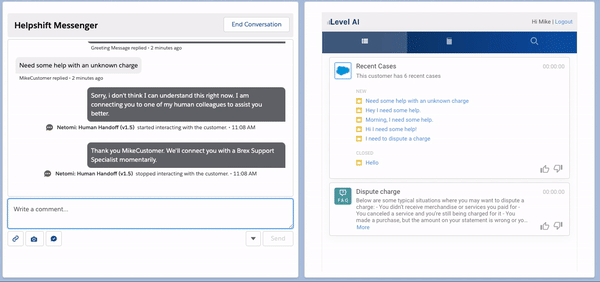
Each displayed card features thumb icons for up- and downvoting the relevance of the information and its helpfulness during the conversation. This feedback helps train the AI to display more appropriate information based on the discussion topics.
To streamline the search process for agents during live interactions, we offer Chat with Your KB, which suggests relevant queries for search. The system predicts these queries with high accuracy based on real-time analysis of intent.
Chat with Your Knowledge Base:
- Autofills the search bar based on what the customer is asking about,
- Extracts and summarizes information from multiple articles and resources to provide at-a-glance answers.
- Provides sources for follow up, based on the generated answer.
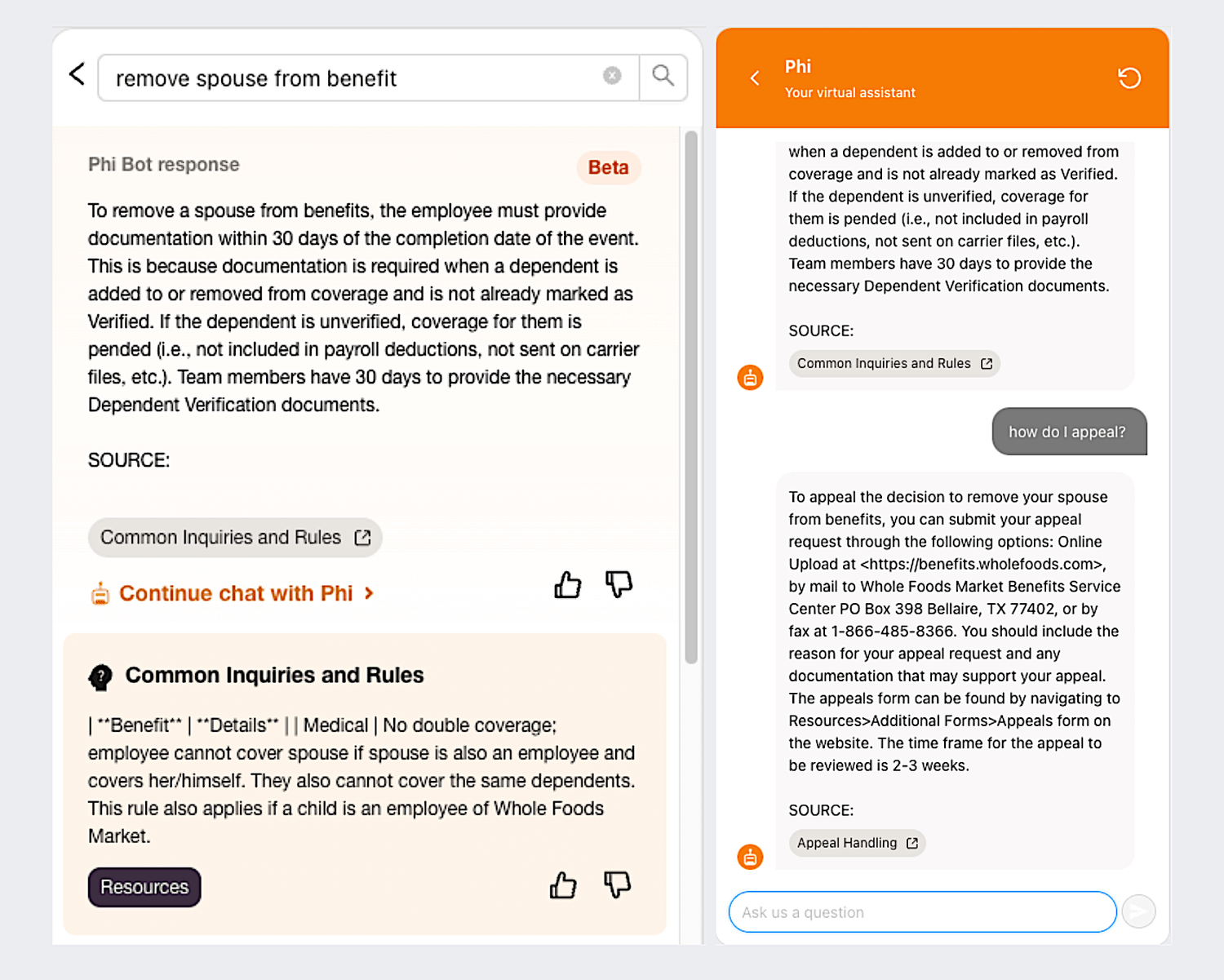
Sales reps using Chat with your KB get suggestions or ideas for a shift in strategy if and when a conversation takes an unfavorable turn. The software dynamically suggests queries relating to different value propositions from your knowledge base.
In response to customer objections, the system can provide specific counterpoints supported by data from strategies that other reps found successful and upvoted.
For customer service agents, this search functionality is especially useful during calls where flexibility is required and they need tailored information at their fingertips.
Chat with your KB helps fill gaps where real-time answers from managers or escalation teams are unavailable by suggesting queries to find and deliver critical information.
By providing answers in real time, Agent Assist enhances agents’ QA scores by supplying the relevant knowledge and answers needed to support customers effectively.
InstaScore for Effective Assessments
Many conversational intelligence platforms that score agent behavior typically assess whether and in which order specific keywords are mentioned by agents. This creates a rigid performance dynamic, emphasizing rote words over genuine service.
Level AI’s advanced understanding and analysis of conversations allow it to evaluate agents more thoroughly and grade them against rubrics such as:
- Did the support agent clearly introduce themselves and the company?
- Did the support agent demonstrate empathy towards the customer’s situation?
- Did the sales agent remain patient, even if the prospect was frustrated or difficult?
- Did the sales agent clearly communicate product features and benefits?
For each rubric, InstaScore provides a metric expressed as a percentage, allowing managers and QA staff to instantly assess the agent's performance.
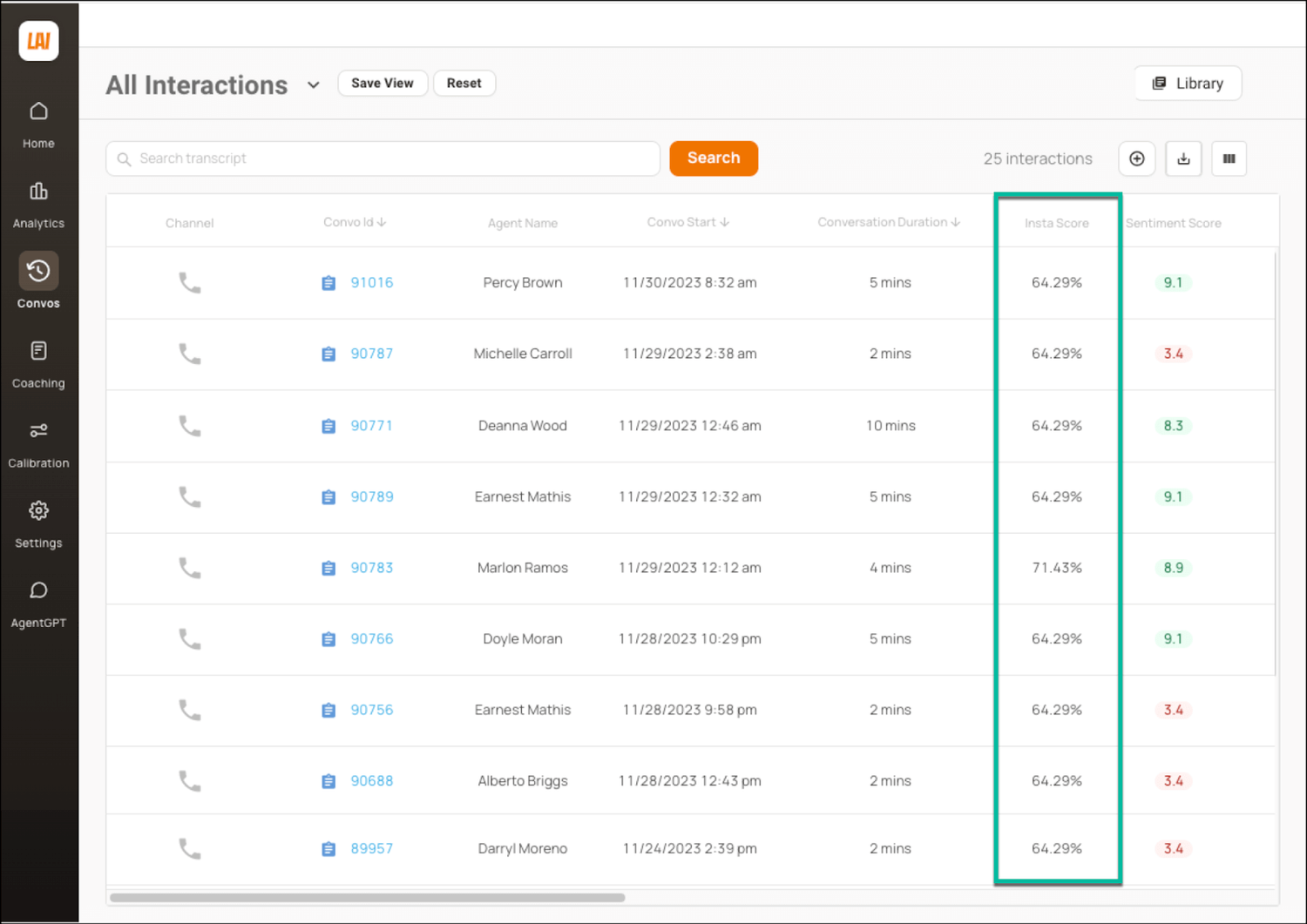
Clicking on InstaScore displays further details and evidence to support the system’s assessment.
This way of auto scoring allows for highly effective sampling of customer conversations for better manual QA, allowing analysts to identify low-performing agents at a glance to know which conversations to address.
Insights for Continuous Improvement
Not only can sales managers and coaches in the contact center use InstaScore to identify top performers and hone in on areas for individualized coaching, but Level AI also highlights potentially problematic conversations.
InstaReview identifies interactions with negative metrics such as higher-than-usual assists or low customer satisfaction, and displays these "coachable moments" prominently in the platform’s conversation dashboards to save managers time in deciding which calls to act upon:

The platform also offers additional coaching features, such as allowing administrators to share dashboards containing conversation metrics with agents for self-learning.
This helps agents review their performance, identify areas for improvement, and track their progress over time.
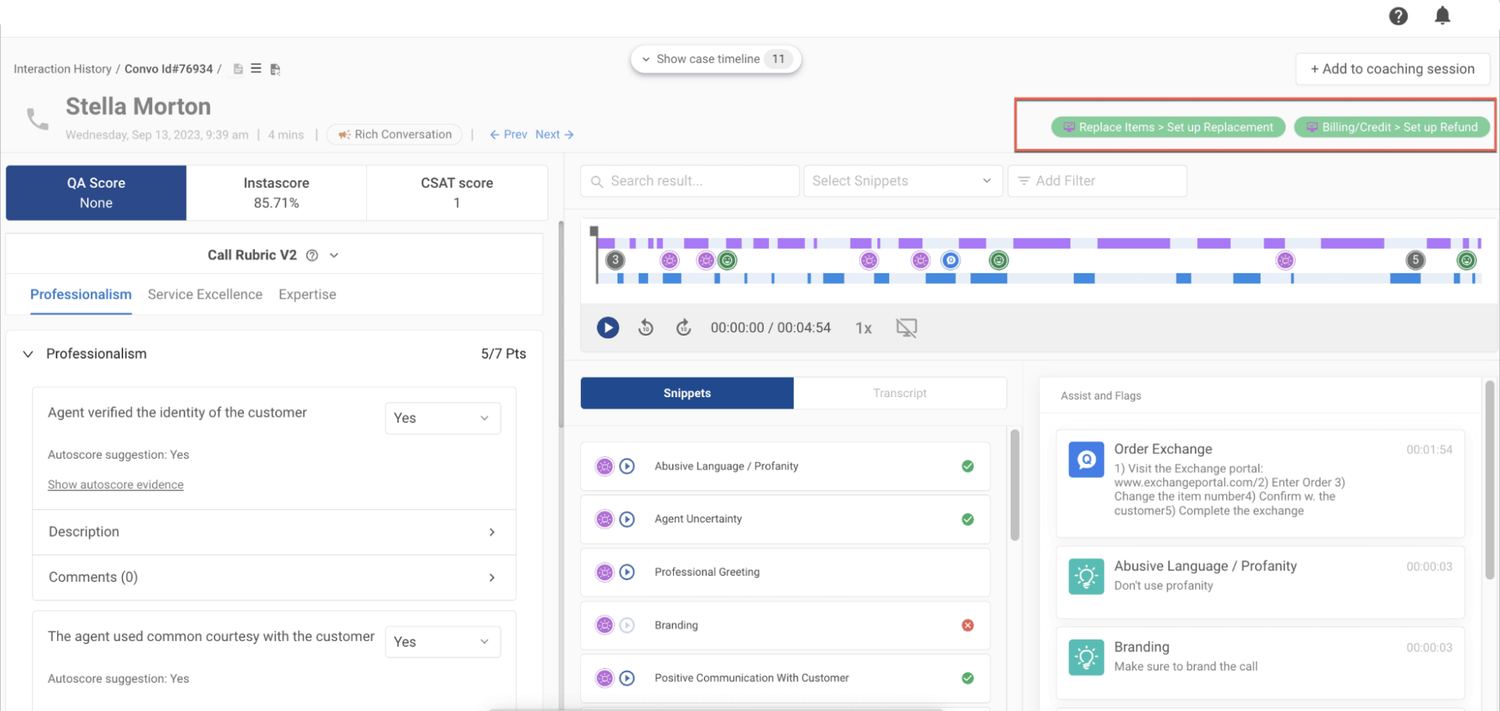
Additionally, we offer dashboards allowing staff to initiate and manage coaching sessions from the platform itself:
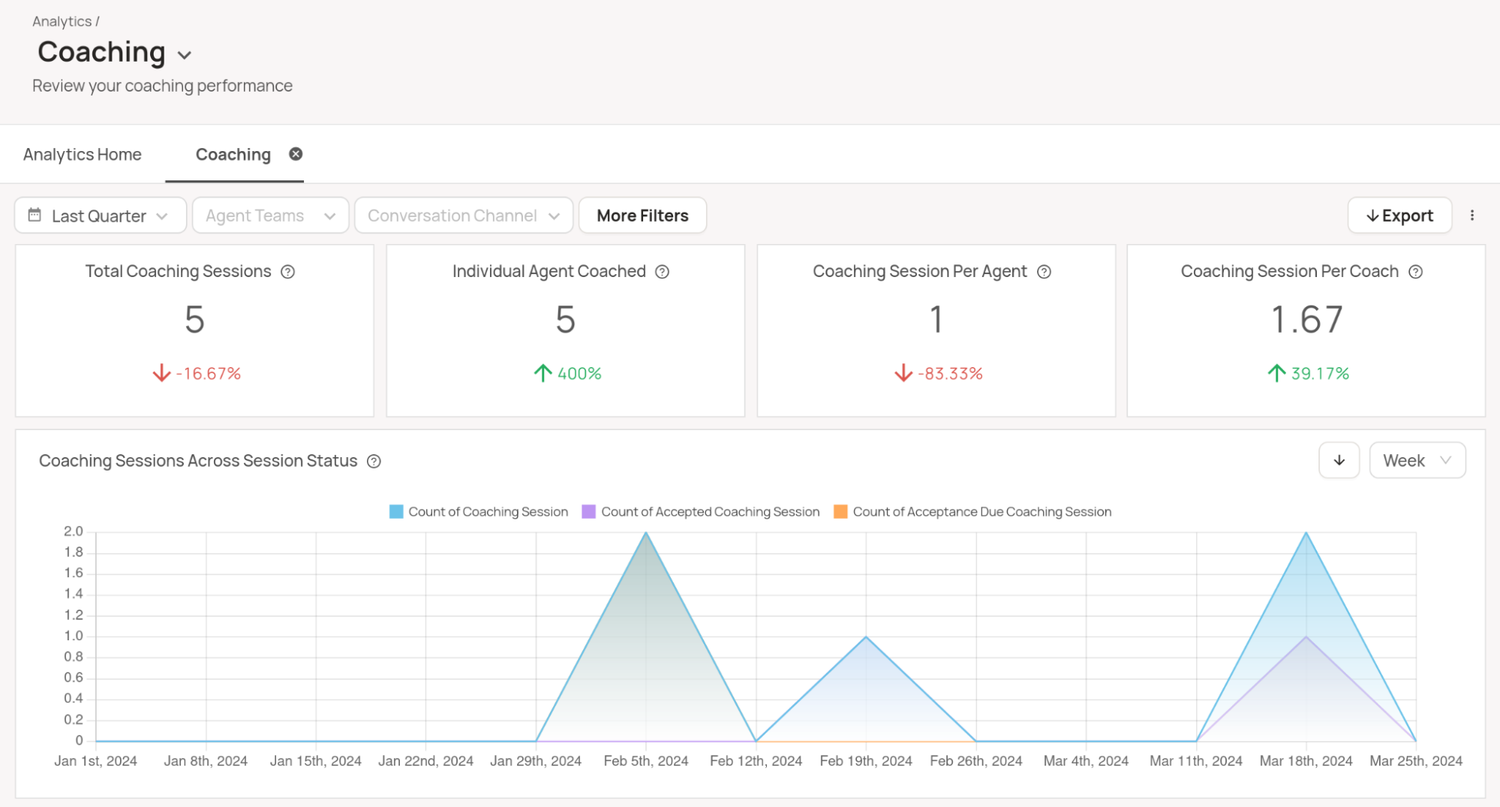
InstaReview not only provides the data necessary for individualized coaching but also highlights areas where managers can celebrate strengths and address gaps in collective performance. This holistic view helps boost overall team performance by focusing on both achievements and areas for improvement.
Categorization and Smart Summary for Optimized Workflows
To help alleviate post-call dispositioning tasks for agents, our AI automatically categorizes each interaction by assigning it both a category and a subcategory. Through automation, the system ensures more consistent and accurate categorization compared to manual processes handled by agents.
Support and sales teams can also define their own categories by providing the system with example phrases. Level AI uses these phrases to better understand which categories they belong to, even when the phrases are expressed in vastly different ways. This is possible because our semantic intelligence model understands the meanings behind words.
When manually creating categories, the system provides both optimal and near-miss example terms for administrators to choose from. By accepting or rejecting these terms, users help train the AI to better understand the nuances and context of language, thereby improving its accuracy and relevance in categorizing future interactions.
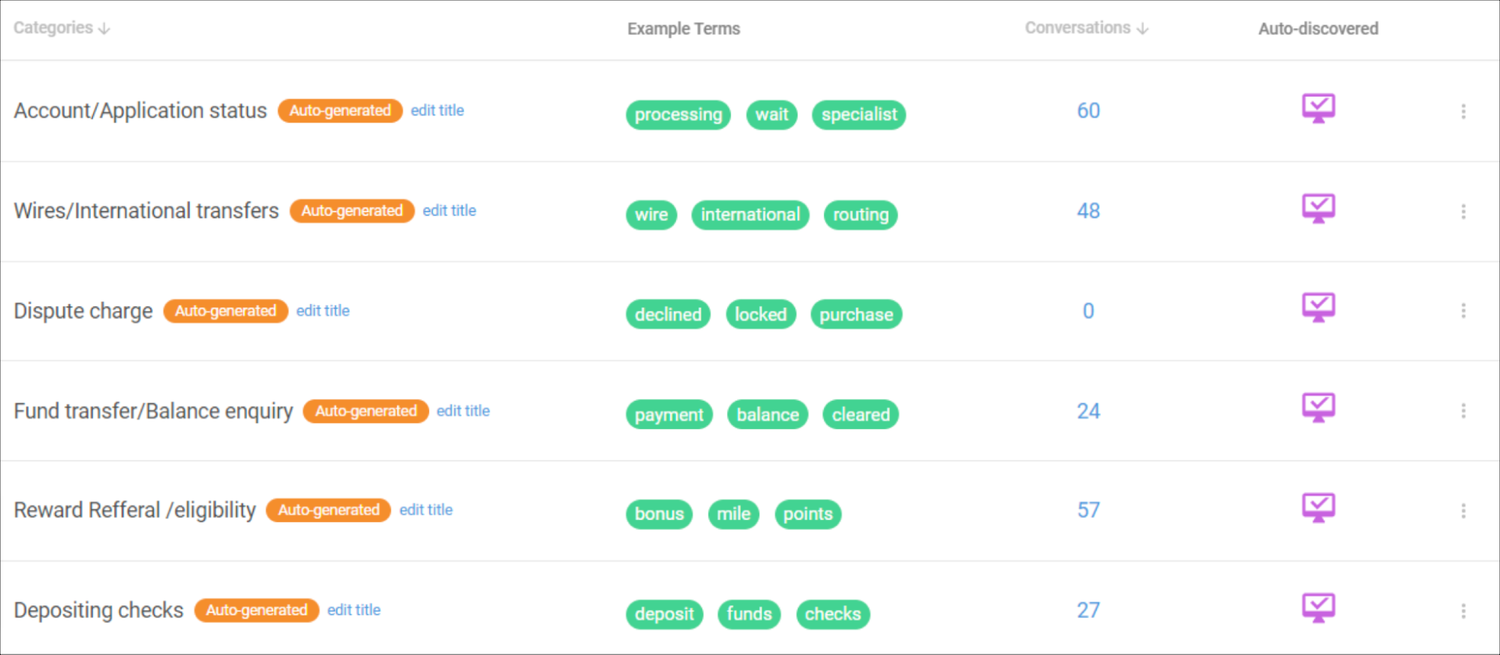
The platform’s AI-powered Smart Summary auto generates summaries for every interaction, providing users with an at-a-glance summary that includes:
- The primary reason for the conversation
- Actions taken by the agent
- Overall resolution
- Follow-up action items (if needed)
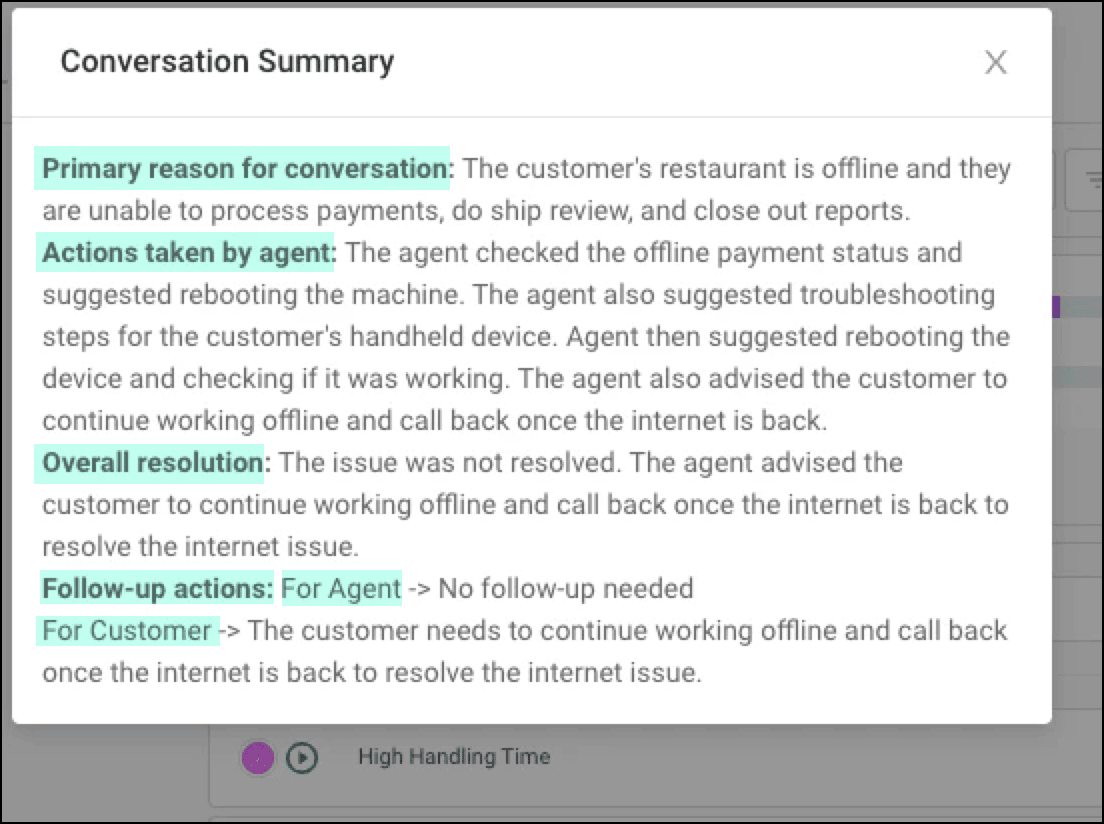
Deep Dive into Customer & Sales Insights with Reporting
Level AI offers flexible reporting for conversational intelligence by allowing users to mix and match data in useful and interesting ways. The platform itself provides customizable dashboards and a Query Builder for creating tailored reports and visualizations that highlight the most relevant insights.
This flexibility allows you to visualize the metrics that matter most to your sales or customer experience strategies and forecasting, and answer fascinating questions such as:
- What intents, identified through conversation tags, are most frequently associated with high sales conversion rates?
- How do specific product or service mentions, analyzed through sentiment tags, impact overall customer sentiment?
- How do specific sentiment scores correlate with the frequency of sales objections during interactions with prospects?
- Do calls with multiple sentiment shifts (e.g., from negative to positive) tend to last longer than calls with stable sentiments?
- How does the frequency of specific intents during a call relate to the call’s length?
The Level AI API enables you to extract data not only from our platform but also from a wide array of external sources, such as your CRM, call analytics software, ticketing system, survey tools, and more. This integration helps develop potentially powerful insights into your prospects or customers.
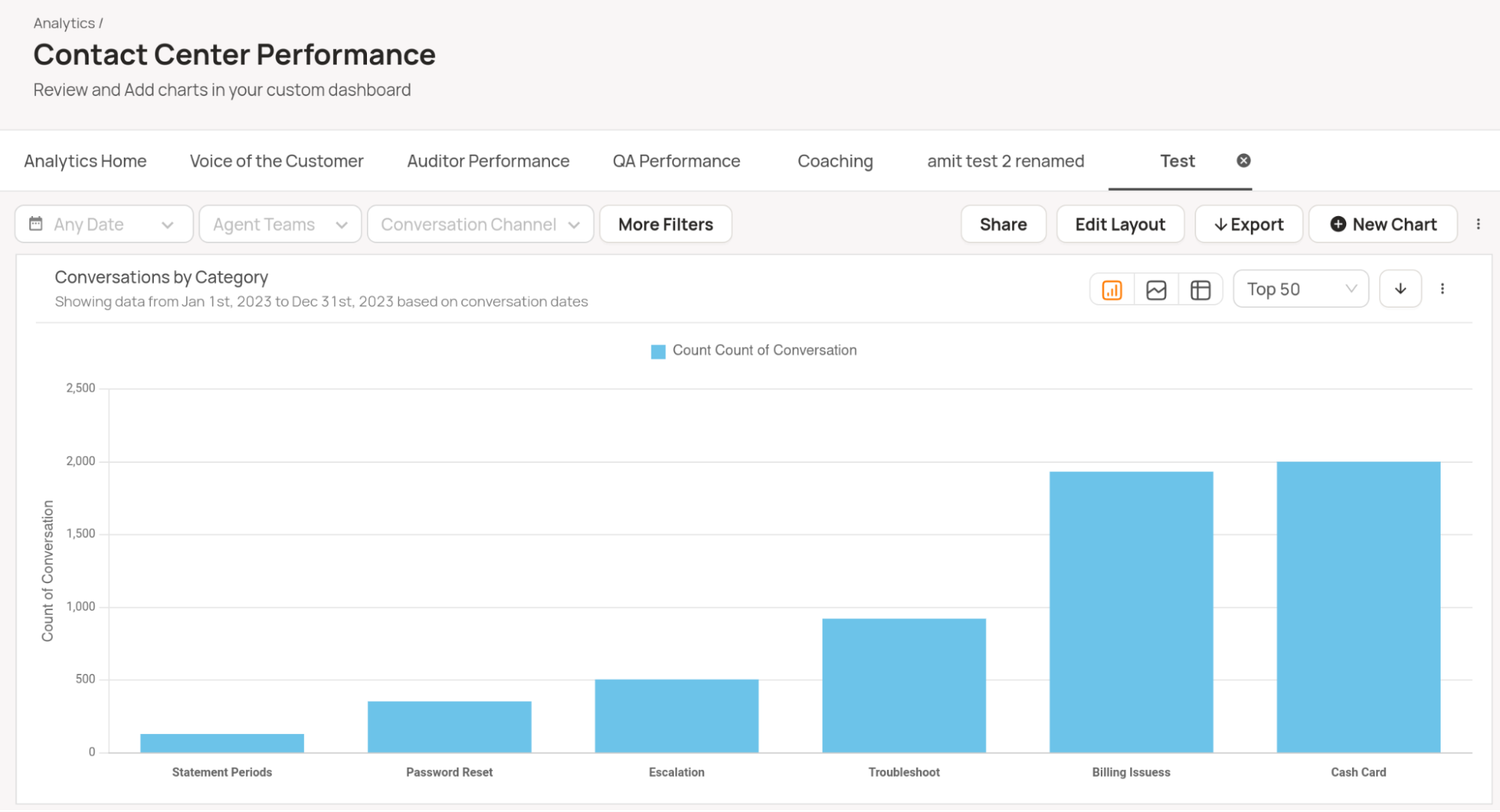
The Query Builder allows you to build custom dashboards using data from disparate sources:
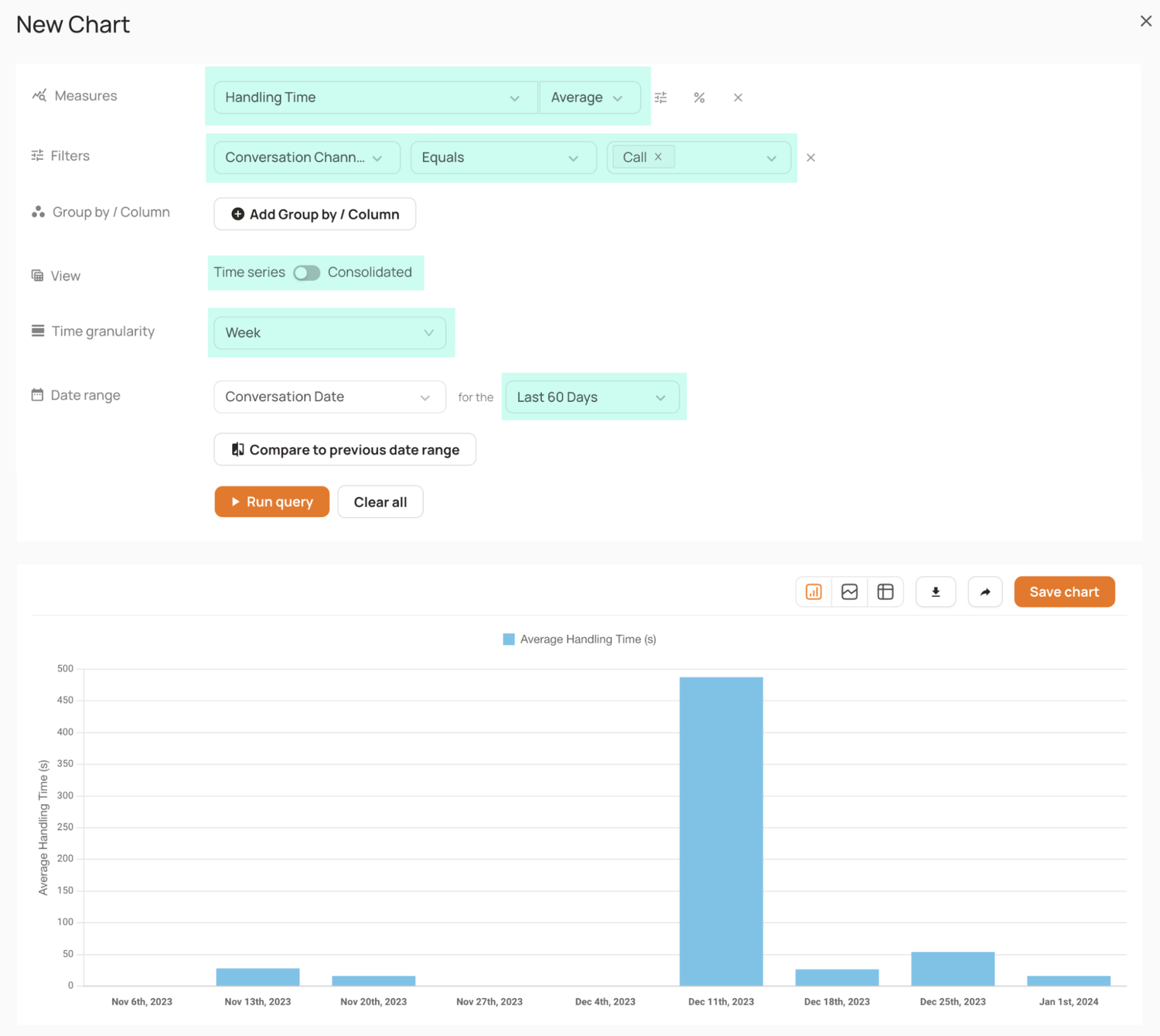
Uncover Hidden Trends with Level AI’s VoC Insights
Voice of the Customer (VoC) data typically comes from post-call surveys and is challenging to capture and analyze due to the fact that generally only a small portion of extremely engaged or extremely agitated customers respond, with little response from the majority who fall in between.
Level AI captures VoC data automatically during interactions with agents, providing not only the usual metrics like NPS, CSAT, and FCR scores, but also detecting and revealing subtle trends in how prospects and customers perceive you.
Examples of the kinds of VoC data collected by our platform include:
- Mentions of competitors in sales objections
- Prospects needing more clarification about a product’s benefits
- New, previously undetected customer preferences
These analytics are available automatically, without the need for additional actions such as sending out and collecting surveys.
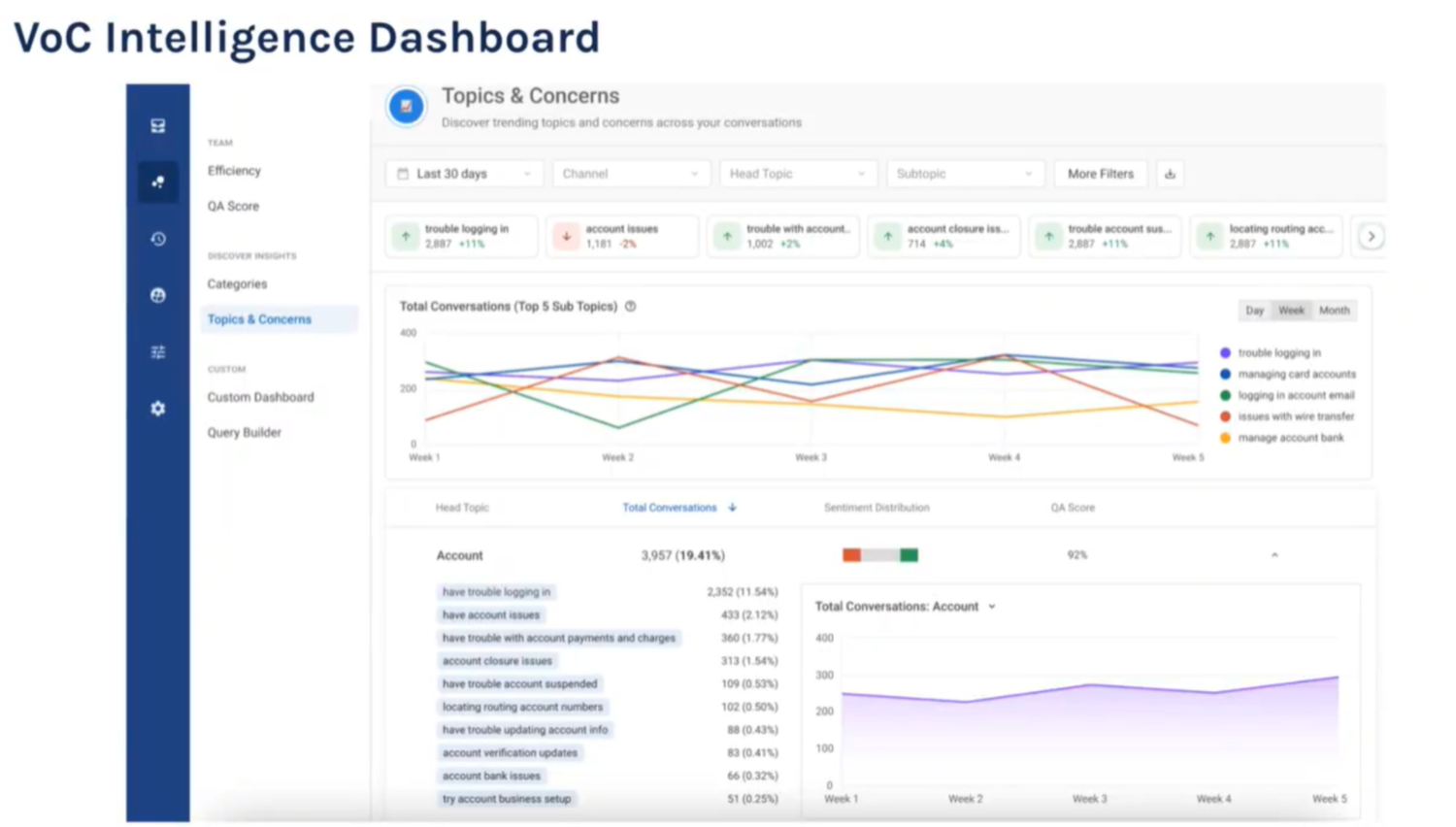
With this data, customer success managers and QA staff can gain deeper insights into customer pain points. This understanding enables them to effectively organize training, onboarding, and documentation, and develop new product features to address these issues — ultimately enhancing the organization’s business performance.
Level AI puts aggregates VoC data in intuitive dashboards:
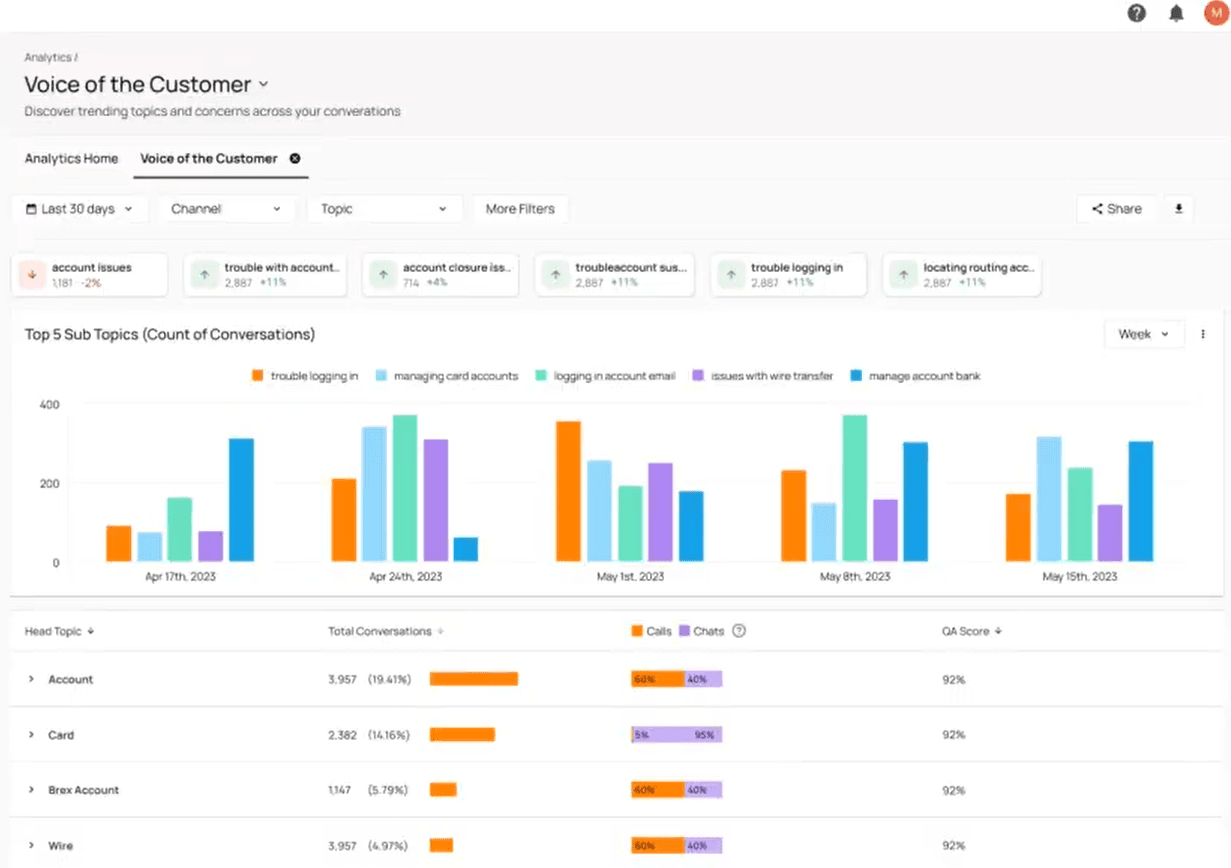
Ready to see the power of conversational intelligence in action? Schedule a demo with Level AI today and discover how unstructured conversational data gets turned into valuable business intelligence.
2. Conversational Intelligence Software for Sales
Below, we describe two alternatives offering conversational intelligence for sales teams:
- Gong
- Einstein Conversation Insights by Salesforce
Gong: Revenue Intelligence Platform

Gong is a conversational intelligence platform designed specifically for sales. It analyzes every customer interaction throughout the sales process and includes a feature for lead qualification. This feature helps determine whether a lead is worth pursuing by assessing if their needs align with your offerings or if they might abandon the product due to a poor fit.
Additionally, Gong allows you to define your Ideal Customer Profile (ICP) and track prospect data against ICP benchmarks.
Pricing
Their license is based on the number of users needed and integrations are included.
Einstein Conversational Insights by Salesforce
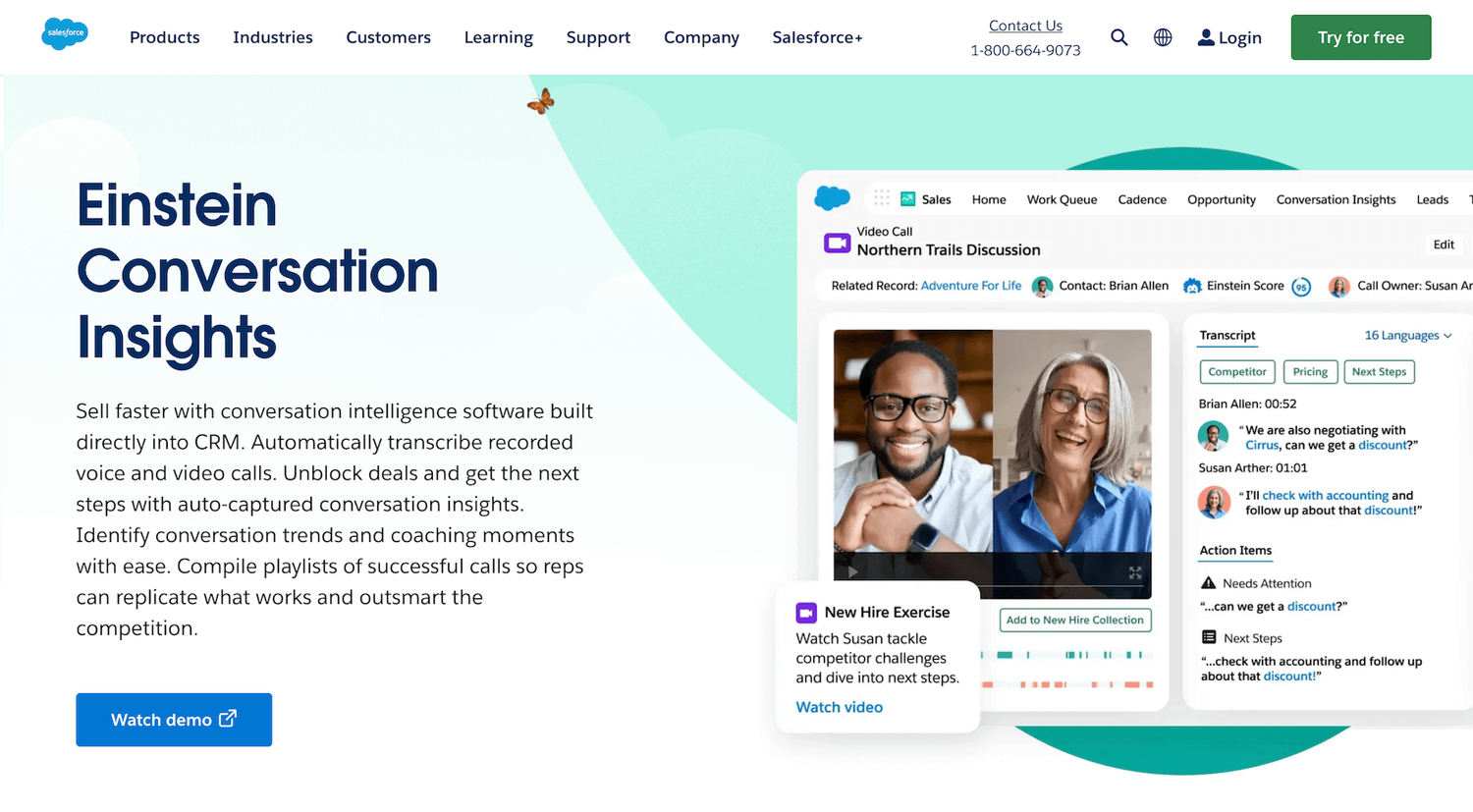
Einstein Conversation Insights is included as an add-on for Salesforce’s High Velocity Sales (HVS) and some Sales Cloud editions, but it can also be purchased as a standalone.
From their own product information, Einstein Conversation Insights is optimized for sales conversations and many features are limited to sales use cases.
There are three tiers within Einstein Conversational Insights, starting with the basic version:
1. Einstein Conversation Insights (Basic Version)
- Call insights
- Automatic transcription
2. Einstein Conversation Insights and Sales Engagement
- Lead scoring
3. Einstein Conversation Insights and Enablement
- Enablement analytics
- Conversion and revenue milestones
Each license includes 120 processed hours for voice and video calls per year.
Pricing
This add-on is included at no additional cost if you have Sales Cloud Unlimited or Sales Cloud Performance. The Sales Engagement add-on is a monthly $50 per user, while the Enablement add-on is monthly $100 per user.
3. Conversational Intelligence Software for Customer Service
This section provides three conversational intelligence tools for customer experience teams:
- Dialpad
- Qualtrics
- CallMiner
Dialpad: Communication Tool with Intermediate CI Insight
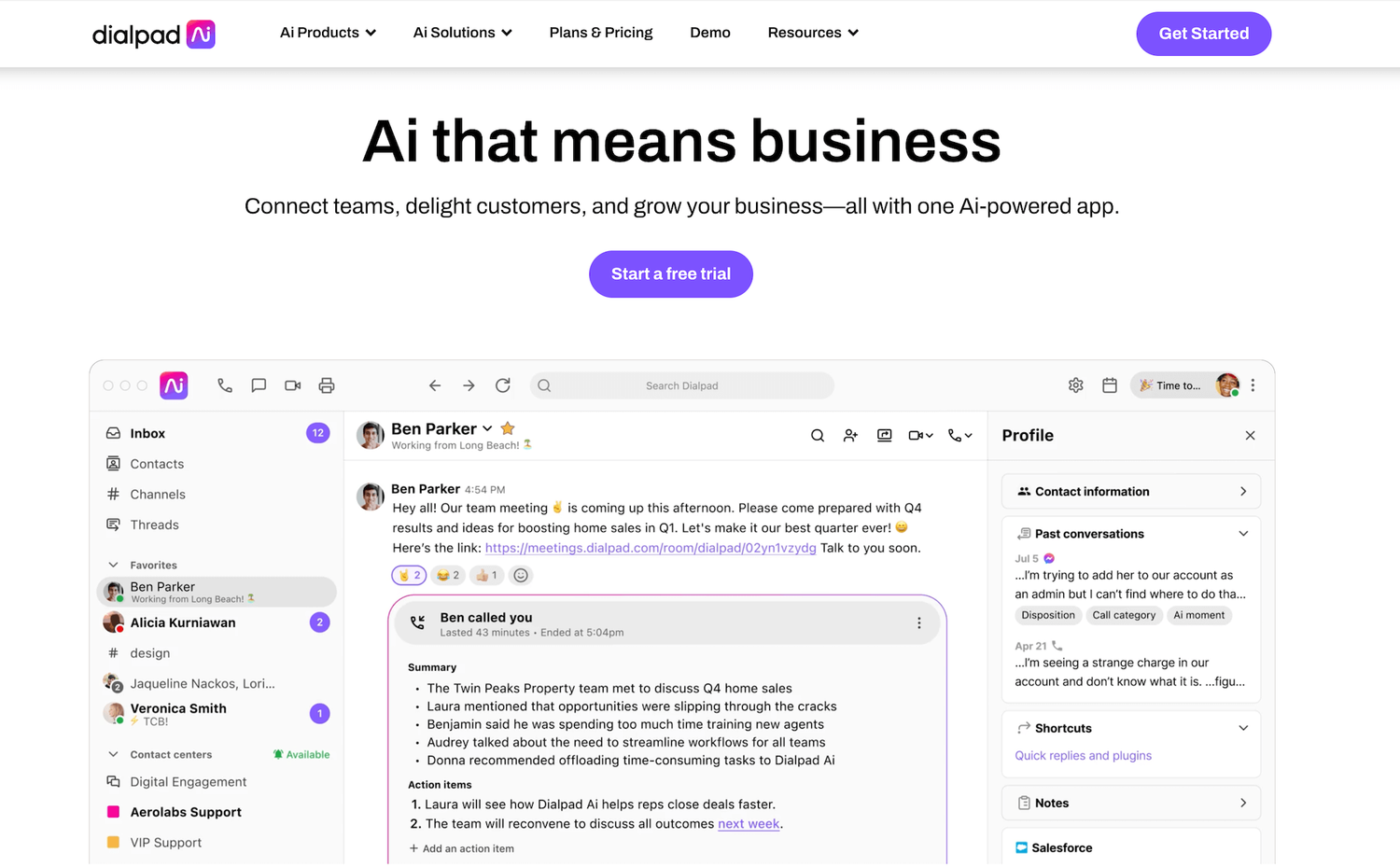
Although Dialpad has evolved to include sales in their platform, they started as a business phone system for customer support centers. They’ve added built-in conversation intelligence features to their system, offering call recording, transcription, and analytics for agents.
Many of their AI features are rooted in customer service and CX:
- Omnichannel customer service
- Digital customer engagement across messaging, web, and social outlets
- Self service, conversational AI chatbots
- AI CSAT with predictive insights and real-time reporting
While not as advanced or robust of a conversational intelligence platform as the other enterprise options like Level AI, Gong, or Salesforce, it’s a popular option for improving call center workflows that comes with intermediate conversational intelligence capabilities.
This is a potentially good choice for those who also want a business phone system for their contact center in addition to some AI capabilities.
Pricing
Plans start at $27 per month per user.
Qualtrics: Insight for Customer Engagement
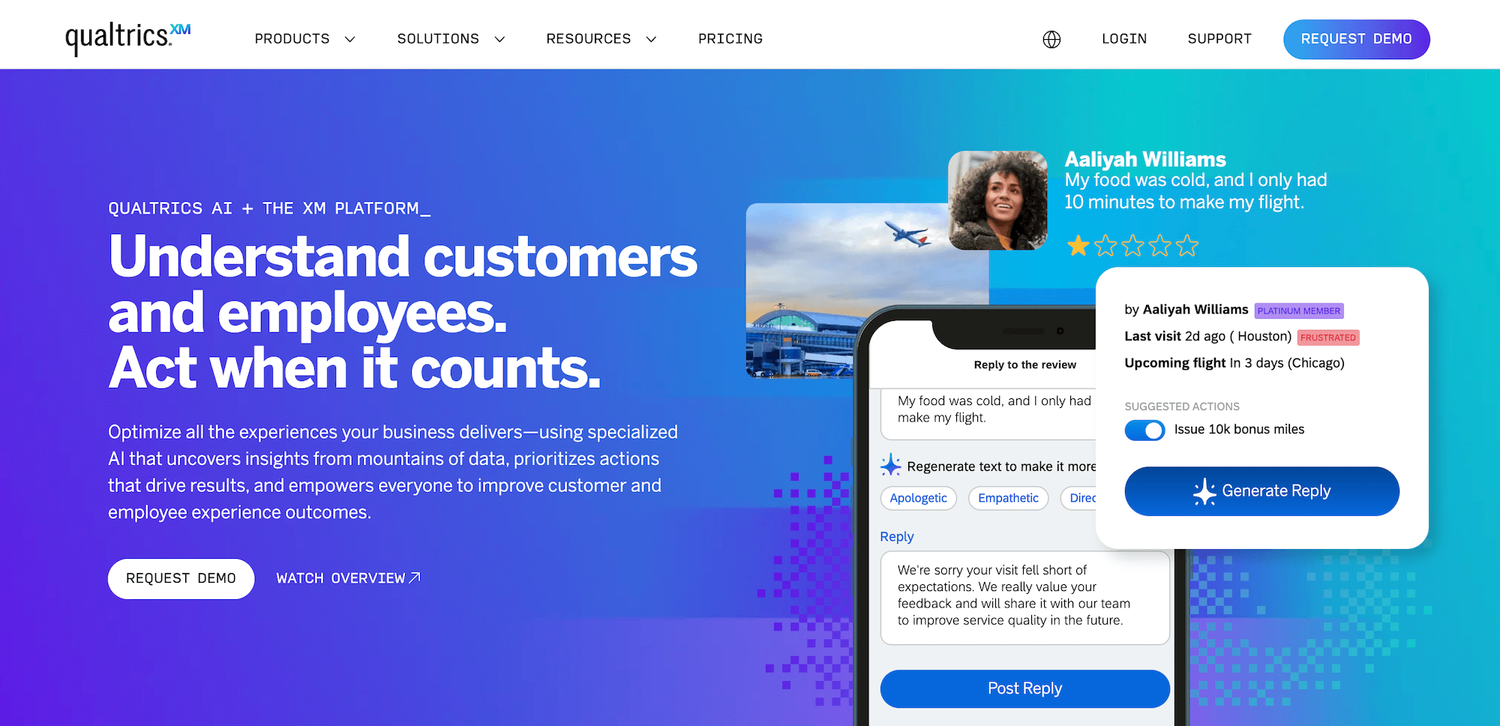
Qualtrics has always centered their products around VoC insights, and are likely recognizable for that reason.
Qualtrics XM Discover includes new conversational intelligence capabilities to find customer feedback in conversations across different channels, including cases, chat, voice transcriptions, emails, surveys, ratings, and reviews on third party websites, social media, and online communities.
Qualtrics is a notable choice for gaining deep insight into customer and employee experience, as well as into their journeys across multiple channels.
Pricing
They require potential customers to go on their website and request pricing.
CallMiner: Conversational Interaction Insights
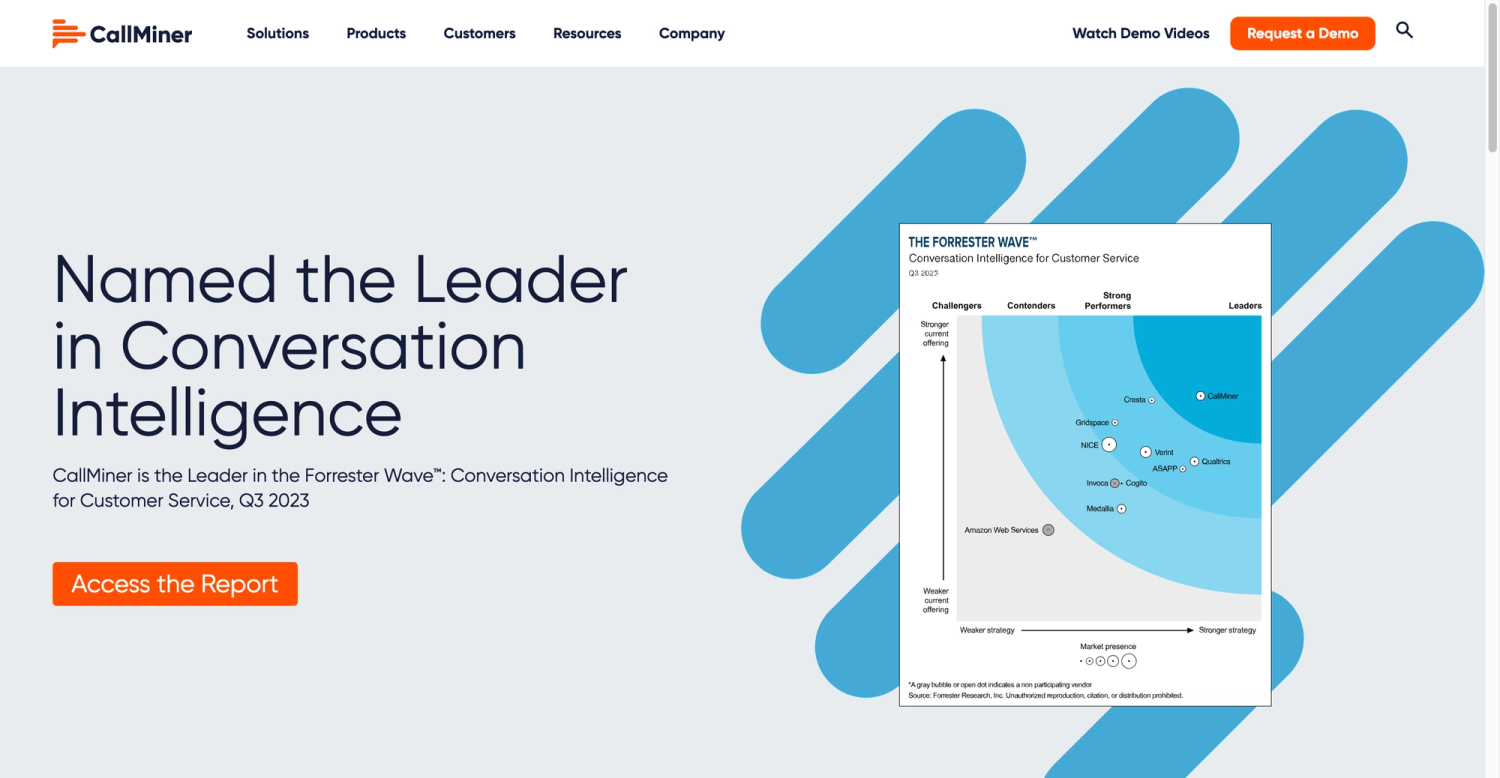
CallMiner caters to contact centers that are looking to leverage AI to improve customer experience and help service agents. They emphasize real-time features for agent support.
Their features include several in-the-moment CX interventions like using sentiment analysis to identify at-risk customers in real time. Live Listen allows managers to listen to a customer call to support agents. Agents also have the ability to "call for help" to get their supervisor’s attention as a situation escalates.
Pricing
Licenses are $89 per user per month.
Getting Started with Level AI’s Conversational Intelligence
Level AI’s semantic intelligence model allows you to analyze the intent and sentiment of 100% of sales and customer support interactions. This capability highlights customer issues and effective sales strategies, providing actionable insights to improve customer experience and drive business growth.
Ready to see the power of conversational intelligence in action? Schedule a demo with Level AI today and discover how unstructured conversational data gets turned into valuable business intelligence.
Keep reading
View all

